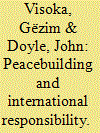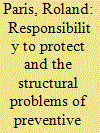| Srl | Item |
| 1 |
ID:
135766


|
|
|
|
|
| Summary/Abstract |
While malicious acts by insurgents, rebels and tribes have attracted considerable attention in recent years; peacekeeping fatalities are most often caused by accident and illness. Yet despite this, malicious acts remain the major focus of journalistic reporting and academic study. This article places malicious acts into a broader context and highlights the more pressing threats posed by accident and illness.
|
|
|
|
|
|
|
|
|
|
|
|
|
|
|
|
| 2 |
ID:
135763


|
|
|
|
|
| Summary/Abstract |
Recent efforts to implement gender mainstreaming in the field of security sector reform have resulted in an international policy discourse on gender and security sector reform (GSSR). Critics have challenged GSSR for its focus on ‘adding women’ and its failure to be transformative. This article contests this assessment, demonstrating that GSSR is not only about ‘adding women’, but also, importantly, about ‘gendering men differently’ and has important albeit problematic transformative implications. Drawing on poststructuralist and postcolonial feminist theory, I propose a critical reading of GSSR policy discourse in order to analyse its built-in logics, tensions and implications. I argue that this discourse establishes a powerful ‘grid of intelligibility’ that draws on gendered and racialized dualisms to normalize certain forms of subjectivity while rendering invisible and marginalizing others, and contributing to reproduce certain forms of normativity and hierarchy. Revealing such processes of discursive in/exclusion and marginalized subjectivities can serve as a starting point to challenge and transform GSSR practice and identify sites of contestation.
|
|
|
|
|
|
|
|
|
|
|
|
|
|
|
|
| 3 |
ID:
135767


|
|
|
|
|
| Summary/Abstract |
This article expands the conceptual and empirical understanding of relational responsibility in peacebuilding, by unpicking the often ill-defined notion of responsibility into three discrete and hierarchical categories – attributability, answerability and accountability. Present practices of international responsibility for their executive powers in peacebuilding missions are more affiliated with attributability and answerability than accountability. In order to substantiate and elaborate empirically this differentiated account of responsibility, the article explores the UN and EU responsibility mechanisms in Kosovo, focusing on their institutional design, effectiveness and results, as well as highlighting practical limitations and problems. A more specific conceptualization of these practices, allows a clearer analysis of the aims and limitations of the mechanisms in place.
|
|
|
|
|
|
|
|
|
|
|
|
|
|
|
|
| 4 |
ID:
135764


|
|
|
|
|
| Summary/Abstract |
The data on sexual exploitation and abuse (SEA) in UN peacekeeping missions show a sharp decline between 2006 and 2007 which has yet to be explained in the relevant literature. This article partially closes that gap by examining one measure which was introduced to improve investigation processes and deter possible perpetrators, the conduct and discipline units (CDUs). Using a mixed methods design, the quantitative analysis shows that overall, the introduction of a conduct and discipline unit in missions is negatively and significantly correlated with the number of SEA allegations. The case study of MONUC/MONUSCO corroborates these results, indicating that deterrence measures likely contributed to the reduction of the number of allegations.
|
|
|
|
|
|
|
|
|
|
|
|
|
|
|
|
| 5 |
ID:
135762


|
|
|
|
|
| Summary/Abstract |
While the normative and legal aspects of the Responsibility to Protect (R2P) doctrine have been explored in great detail, scholars have largely overlooked the more practical question of whether and how international military action can avert mass atrocities. To shed light on this question, this article investigates the ‘strategic logic’ of preventive humanitarian intervention, or the assumed link between external military action and the desired outcome of preventing or stopping mass killing. It contends that there are five fundamental and seemingly irremediable tensions in this logic, all of which cast doubt on the feasibility of preventive humanitarian intervention and on the long-term prospects of R2P.
|
|
|
|
|
|
|
|
|
|
|
|
|
|
|
|
| 6 |
ID:
135765


|
|
|
|
|
| Summary/Abstract |
This article examines the necessary conditions behind the decision made by the Government of Sweden to participate with fighter jets in the monitoring of the no-fly zone over Libya in March 2011. The article identifies five explanatory factors whose presence was necessary for Sweden's military contribution: a feeling of moral obligation to intervene on the part of the government; the international legal foundation for the operation; strong leadership provided by NATO; broad parliamentary support; and the availability of military capabilities.
|
|
|
|
|
|
|
|
|
|
|
|
|
|
|
|